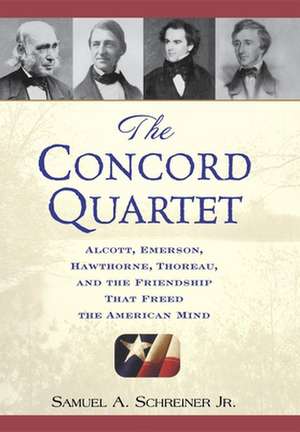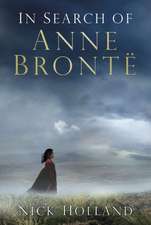The Concord Quartet: Alcott, Emerson, Hawthorne, Thoreau and the Friendship That Freed the American Mind
Autor Samuel Agnew Jr. Schreineren Limba Engleză Hardback – 21 aug 2006
we will work with our own hands;
we will speak our own minds.
--Ralph Waldo Emerson, "The American Scholar," 1837
From the start of transcendentalism and America's intellectual renaissance in the 1830s, to the Civil War and beyond, the story of four extraordinary friends whose lives shaped a nation
"Beginning in the 1830s, coincidences that seem almost miraculous in retrospect brought together in Concord as friends and neighbors four men of very different temperaments and talents who shared the same conviction that the soul had 'inherent power to grasp the truth' and that the truth would make men free of old constraints on thought and behavior. In addition to Emerson, a philosopher, there was Amos Bronson Alcott, an educator; Henry David Thoreau, a naturalist and rebel; and Nathaniel Hawthorne, a novelist. This book is the story of that unique and influential friendship in action, of the lives the friends led, and their work that resulted in an enduring change in their nation's direction."
--From the Prologue
Preț: 186.49 lei
Nou
35.69€ • 37.35$ • 29.70£
Carte disponibilă
Livrare economică 10-24 martie
Specificații
ISBN-10: 0471646636
Pagini: 246
Dimensiuni: 163 x 236 x 24 mm
Greutate: 0.51 kg
Editura: Wiley (TP)
Locul publicării:Hoboken, United States
Public țintă
Readers of biography and American history, those interested in 19th century American writers; public libraries, courses in 19th century American literature.Recenzii
Textul de pe ultima copertă
we will work with our own hands;
we will speak our own minds."
--Ralph Waldo Emerson, "The American Scholar," 1837
From the start of transcendentalism and America's intellectual renaissance in the 1830s, to the Civil War and beyond, the story of four extraordinary friends whose lives shaped a nation
"Beginning in the 1830s, coincidences that seem almost miraculous in retrospect brought together in Concord as friends and neighbors four men of very different temperaments and talents who shared the same conviction that the soul had 'inherent power to grasp the truth' and that the truth would make men free of old constraints on thought and behavior. In addition to Emerson, a philosopher, there was Amos Bronson Alcott, an educator; Henry David Thoreau, a naturalist and rebel; and Nathaniel Hawthorne, a novelist. This book is the story of that unique and influential friendship in action, of the lives the friends led, and their work that resulted in an enduring change in their nation's direction."
--From the Prologue











